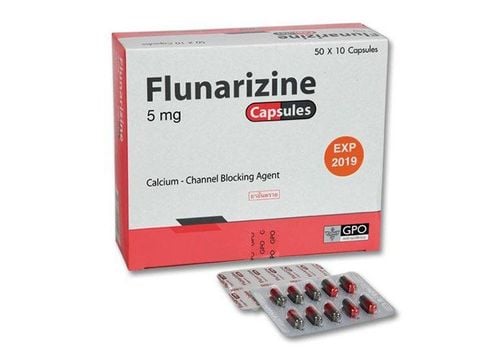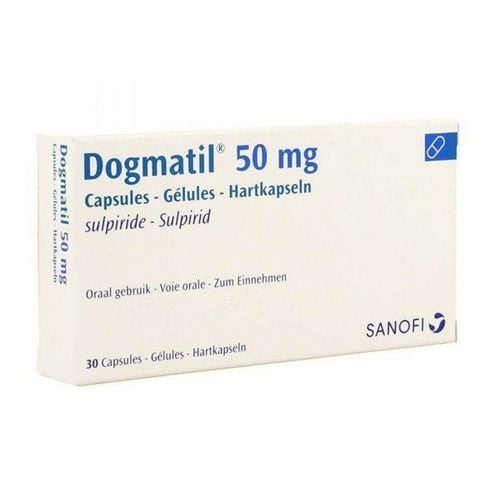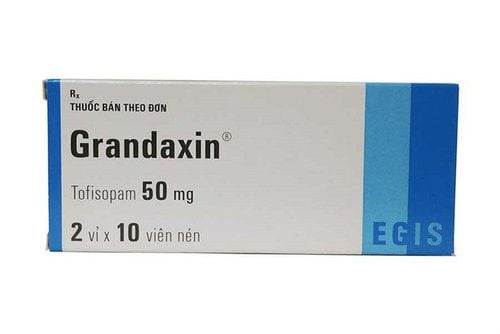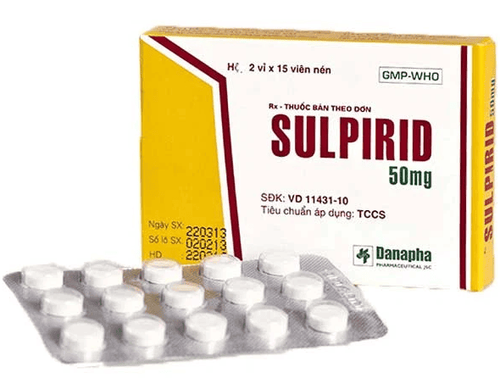Levosulpiride is used to treat symptoms of indigestion in the gastrointestinal tract and schizophrenia. The article below will provide you with some information on its usage, dosage, and possible side effects when using this medication.
1. What disease does Levosulpiride treat?
Levosulpiride is commonly indicated for the treatment of the following conditions:
- Acute and chronic schizophrenia: This is the primary indication for Levosulpiride. It is also used in patients with depression, anxiety disorders, and other psychiatric disorders.
- Gastrointestinal symptoms of dyspepsia: such as belching, heartburn, nausea, vomiting, epigastric discomfort, and bloating. Additionally, it is used to treat irritable bowel syndrome.
- Burning mouth syndrome (BMS): This condition involves a burning sensation in the mouth without any identifiable cause, with pain typically localized to the tongue or lips. A dose of 100 mg/day of Levosulpiride has been shown to reduce the burning or stinging sensation in the mouth.
- Acute vestibular disorders: Levosulpiride has been shown to improve symptoms in unilateral vestibular disorders. The recommended dosage is 25 mg three times a day for ten days.
- Premature ejaculation: Premature ejaculation can be treated with antidepressants and other supplementary medications. According to a study, taking 25mg of Levosulpiride once a day for 60 days significantly improves ejaculation control.
2. What are contraindications of Levosulpiride?
Levosulpiride is contraindicated or should be used with caution in the following cases:
- Sensitivity or allergy to any component of Levosulpiride.
- Epilepsy or manic episodes in schizophrenia.
- Breast cancer.
- Adrenal gland tumor.
- Children under 14 years old with Parkinson's disease.
- Severe renal or hepatic impairment.
- Asthma or cardiovascular diseases.
- Severe gastrointestinal disorders, such as gastrointestinal bleeding, perforation, or obstruction.
- Alcoholism.
- Hypokalemia.
- Pregnant and breastfeeding women, as the drug can pass into breast milk; thus, its use should be limited in breastfeeding women.
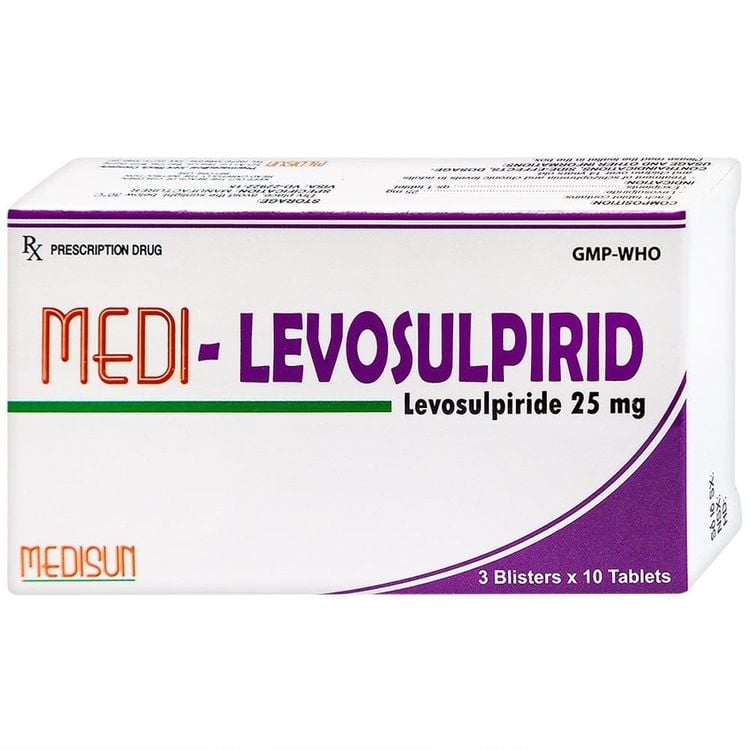
3. Dosage of Levosulpiride
The dosage of Levosulpiride for each patient will be adjusted according to age, physical condition, and medical history. Specifics are as follows:
For adults: For treating functional dyspepsia symptoms: 75 mg per day, divided into three doses. For treating acute and chronic schizophrenia: 200–300 mg per day, divided into three doses.
For patients over 14 years old, the dosage should be reduced.
For children under 14 years old: The drug should not be used.
For patients with kidney failure: the dosage should be reduced, or the interval between doses should be increased. This depends on the patient's creatinine clearance rate.
- Creatinine clearance 30–60 ml/min: Use 2/3 of the usual dose.
- Creatinine clearance 10–30 ml/min: Use about 1/2 of the usual dose.
- Creatinine clearance below 10 ml/min: Use 1/3 of the usual dose.
- In addition to adjusting the dosage, patients may increase the interval between doses. However, in cases of severe renal failure, Levosulpiride should not be used.
4. Some side effects when using Levosulpiride
Take the medication as prescribed by your doctor in terms of dosage and duration of treatment.
Levosulpiride typically begins to take effect about 1 to 2 hours after ingestion. Its effects usually last between 5 to 8 hours. For optimal effectiveness, it is best to take the medication at least 30 minutes before meals.
Drink plenty of water when taking Levosulpiride. Do not use it with alcohol or other stimulants. If any allergic reactions, such as rash or itching, occur while taking the medication, contact your doctor promptly for guidance.
Before using Levosulpiride, inform your doctor about your medical history and current health status. Exercise caution when using the medication in the following cases:
- Kidney failure: reduce dosage and monitor closely during use. In cases of severe kidney failure, Levosulpiride should not be used or should be used intermittently.
- Patients with epilepsy.
- Alcohol addiction or stimulant use.
- Elderly patients, as the medication can cause drowsiness and orthostatic hypotension.
- Patients with mild mania may experience worsening symptoms.
- Unexplained high fever: discontinue use in patients with high fever to rule out neuroleptic malignant syndrome.

5. Side effects of Levosulpiride
Here are some possible side effects that may occur while using Levosulpiride:
Common side effects (ADR > 1/100)
- Endocrine: Increased prolactin levels in the blood, leading to increased milk production, breast enlargement, menstrual irregularities, or amenorrhea. These can be managed by reducing the dosage of Levosulpiride.
- Nervous system: Sedation, drowsiness, or insomnia.
Less common side effects when using Levosulpiride (1/1000 < ADR < 1/100)
- Cardiovascular: Arrhythmias, torsades de pointes.
- Nervous system: Extrapyramidal syndrome, Parkinsonism, or excessive stimulation.
Rare side effects when using Levosulpiride (ADR < 1/1000)
- Nervous system: Neuroleptic malignant syndrome, tardive dyskinesia.
- Endocrine: Gynecomastia in men.
- Blood pressure: Bradycardia or arrhythmias, orthostatic hypotension.
Other: Photosensitivity, hypothermia, jaundice due to cholestasis, increased liver enzymes, weight gain.
6. Drug interactions with Levosulpiride
Using multiple medications simultaneously can reduce therapeutic effects or alter their mechanisms, increasing the risk of side effects. Therefore, patients should inform their doctors about all medications they are taking, including vitamins and herbs. Some drugs that may interact with Levosulpiride include:
- Sucralfate and antacids containing aluminum-magnesium hydroxide: Take Levosulpiride at least 2 hours after these medications to avoid reduced absorption.
- Lithium: Increases the risk of extrapyramidal disorders.
- Alcohol: Avoid taking Levosulpiride with alcohol and other alcoholic beverages as it can enhance the sedative effects, causing drowsiness.
- Levodopa: Do not use Levosulpiride concurrently with Levodopa, as it can competitively antagonize Levosulpiride, reducing its effectiveness.
- Antihypertensive drugs: Levosulpiride can enhance the hypotensive effects of these drugs, potentially causing orthostatic hypotension.
- Other central nervous system depressants: Levosulpiride can increase CNS depressant effects, leading to serious consequences, especially in individuals who need alertness or operate machinery. Therefore, caution should be exercised when combining these medications.
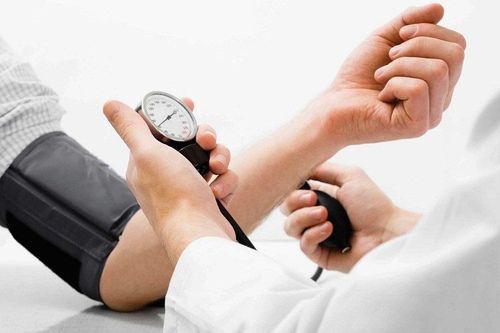
7. Management of Levosulpiride overdose
Symptoms of Levosulpiride overdose typically occur when patients take doses ranging from 1 to 16 g. However, there have been no reports of fatal outcomes at doses up to 16 g. Overdose symptoms vary depending on the amount ingested:
- 1–3g: Clouded consciousness, restlessness, with rare extrapyramidal symptoms.
- 3–7g: Agitation, confusion, and a higher risk of extrapyramidal syndrome.
- >7g: In addition to the above symptoms, patients may experience hypotension and coma. Typically, these symptoms disappear within a few hours. However, if a coma occurs with high doses, it can last up to 4 days.
These are important details regarding Levosulpiride, so it's essential to understand them for effective use.
To arrange an appointment, please call HOTLINE or make your reservation directly HERE. You may also download the MyVinmec app to schedule appointments faster and manage your reservations more conveniently.




